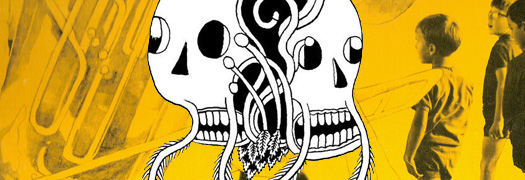
Features | Lists
By The Staff
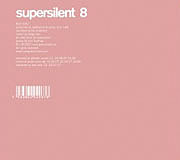
20 :: Supersilent
8
(Rune Grammofon; 2007)
Here is about as far as hardcore experimental is going to go on our list but I am extremely proud that a record like this is in our Top 20, even if it’s primarily because it’s Joel’s and my favorite album of the past ten years while most the rest of the staff is more “ok, I guess I get that, sure” or a few like Ritter murmur something about whales and egg timers. I also find the album metaphorically nought-y due to all the cracks, gaps, and chasms in its composition—the apertures of a central void. What’s sort of coldly comforting is how that void is not so much the absence of substance as the nigh infinite depth just barely ample enough for the insertion of the tip of one’s own soul. If that’s creepily titillating or just plain off-putting, good, because that’s the breed of record we’re dealing with here.
The bountiful negative space would render the whole structure pretty creaky if it didn’t exist in a vacuum. And by that I mean Supersilent are all about cutting off your air supply and shoving you out to drift into the orbit of whatever pulsing Moog line or nanosecond of warm snare will have you. For stretches of time these musical derelicts align and combine into something habitable; on “8.5” the mere survival of your softer extremities on Henriksen’s trumpet whispers and Storlokken’s synth washes feels sublime. At other points 8 seems set upon stripping away every last piece of unnecessary flesh, on whittling the listener’s perception down to a prenatal understanding of music as overwhelming noise formations and vice versa; the free-jam cacophony of “8.7” is like doing an internal cleanse via sand-blasting. You accept and even begin to embrace this record’s brutal mode of associative musical development because it doesn’t sound forced or lifeless, and it doesn’t sound forced or lifeless because Supersilent create music like they were put in a room with some instruments and then the Big Bang happened.
Are these pretentious assertions? Clay’s stated on a few occasions that pretentiousness isn’t actually real, which must be true since there’s no way I can keep it real when talking about 8. This unified instrument of unknown purpose will consume all logic and restraint and spit back in your face some kind of black goo that can apparently fuck with your genetic code but also fuel Johannesburg-sized spaceships. Or, moving on to artsier sci-fi ground, this record is a bit like the titular planetoid in Tarkovsky’s Solyaris, a massive entity that somehow interfaces with us on an almost horrifically intimate level and then forces us to confront repressed memories or things we just don’t want to think about. If I had to guess, I’d say it subjects us to that shit because that’s actually the shit that most defines us.
After Scott posted the list for who was writing which blurb Joel remarked, “I believe Chet will go supernova after writing about Supersilent again.” To which I replied, “And that supernova will leave behind a planet on which Joel can live forever.” That’s some silly nonsense, obviously, but here’s its kernel of truth: when I listen to 8 and try to grasp it, to enclose it with my thought, its immensity and mesmeric draw stretch my consciousness out wider and wider. As that happens I am left vulnerable and the record digs at the parts of myself that were hitherto untouchable. Then it shows me that, in a weird way, it is made of those same parts. Suddenly, the projector is flipped and I am transformed…into something that is bigger than myself, something that endures, one single image that includes those inmost parts of all whom encounter it. A sea of light dances across our cornea; the air we breathe is sculpted time. Okay, yeah, this is just some foreign dudes’ record that’s rife with bizarre noises (maybe even some whales and egg timers), its spaces typically filled by the impatient murmurs of those who will have none of it. But every time I listen to 8 I am reminded—in pretty much the most poignantly dissonant way possible—that I am not alone.
Chet Betz

19 :: Wilco
Yankee Hotel Foxtrot
(Nonesuch; 2002)
We’ve now had about eight years to sit with Yankee Hotel Foxtrot, but it’s come to feel so familiar that it’s hard to imagine a time before it. Its status as a virtually unassailable populist classic and Wilco’s career peak is hard to argue. But the burden of universal praise heaped upon this record can be enough to make you forget how strange and disjointed it often is. The bending, off-kilter riff that snakes through “I Am the Man Who Loves You,” an ostensibly straightforward rocker knocked, like a picture frame after an earth tremor, ever so slightly askew. The shivering chimes and spectral piano chords that haunt “Ashes of American Flags,” and mimic Jeff Tweedy’s nervous confession, “I’m down on my hands and knees every time the doorbell rings / I shake like a toothache when I hear myself sing.” Even the record’s iconic opening lines—beginning with the song of Tweedy’s self: “I am an American aquarium drinker”—feel deliberately disjointed, like clumsy poetry spoken by someone who sounds like he’s been awake for about four days straight. But it’s better for being a little broken, and the patchwork pieces of Yankee Hotel Foxtrot amalgamate into something panoramic and dazzling. This record has wedged a spot into the collective consciousness of listeners of all sorts, and eight years later, the gunky-eyed tone that opens “I Am Trying to Break Your Heart” has, for a lot of people, become as iconic a moment in pop songwriting as the drum crack that opens “Like A Rolling Stone.”
And like a lot of records that, for better or worse, get called “iconic,” Yankee Hotel Foxtrot has a great backstory (which is chronicled in my pick for best music film of the decade, Sam Jones’s exquisitely Don’t Look Back-inspired I Am Trying to Break Your Heart). We know it now: major label drops critical darling, critical darling gives the album away for free, smaller label makes heaps of money via winningly esoteric release, major label kicks itself. It’s the sort of music industry fairy tale we all want so badly to believe in, one that seems to confirm all that we hope in our most naive moments to be true: that record executives don’t know what’s best for us, that great art can somehow transcend seriously damning impediments, that music is more about connections between people than commerce and marketability. In short, it is a fable about the singular power of a great record.
Yankee Hotel Foxtrot represents a snapshot of a hopeful moment in music history. The real hero of the story was the Internet—it allowed the band to skirt the bureaucratic trappings of the industry and it seemed to promise a sort of digital utopia where, in the near future, all great records would be easily discovered and shared. Mediocre music would simply fall by the wayside in such a democratic musical landscape! Yankee Hotel Foxtrot was a triumph over stuffy record execs, yes, but also over even bigger and more abstract enemies of art: impatience! disposability! bottom lines! The sad thing about how we listen to music right now, eight years later, is that nothing feels so hopeful, and those exclamation marks look downright silly. We experience music every day in the sort of environment that unearthed YHF, but we’re becoming jaded. The immediacy with which we can hear anything and everything makes us impatient, hasty; if it doesn’t grip us right away, if it doesn’t come with a certified stamp of approval from a short list of tastemakers, we drag it into the trash without a thought. Though a lot of people reading this are probably self-consciously resistant to this fact, we are moving towards a digital culture where we’re becoming, in our own ways, just as impatient and bottom-line-obsessed as those Reprise execs that the Yankee Hotel Foxtrot narrative vilifies. So what can we do? We can take the time out to give great records the time and the reverence they deserve. As in, when’s the last time you forgot about its cultural significance and got lost in Yankee Hotel Foxtrot? There’s a start.
Lindsay Zoladz
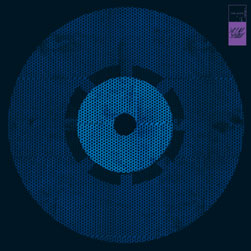
18 :: Knife
Silent Shout
(Rabid; 2006)
As of this day in 2010, I have a continuing, insatiable urge to devour this album—as in: over and over and sometimes lying on my back, positioned like an otter, clam of bruised electro-pop messily pulled apart on my belly. Four long years ago, as of Silent Shout’s release, I was anything but—except for on my back, which is how I get at a mean itch. And that was where I kept my intentions to listen to Silent Shout: between my shoulderblades. Embittered, flabbergasted, jealous, I saw in the Knife’s third album something staunchly unavailable to the listener, and not just because what I saw was a glassy-eyed Venetian plague mask, indifferently phallic, but mostly due to how any gesture the band made to cover up their identity as musicians, to shield themselves from any kind of popular or commercial recognition, just seemed weird, and weird expressly to confuse. Though 2006 proved to be a huge year for the Swedish brother and sister duo, they tepidly stood to the side for most of it, touring (for the first time), but sporadically, and when on stage shrouded indefinitely in lights and smoke and more masks (never on stage for an awards show win, though they’d mercilessly trounced the competition); meanwhile there I was on my back, refusing to wiggle against the carpet. And so we shared obstinance, the Knife and I—until one day midway between now and then I actually listened to the thing.
Immediately, Silent Shout is warm, each digitized thump, thud, and centipedal synth line plush, ergonomic even. “Silent Shout.” “Marble House.” These are frighteningly physical songs, lush with scope despite jittering in place, simmering with unused energy like a pin-pricked battery. Even “Like a Pen” ditches the group’s now ubiquitous, typically pitch-shifted, sometimes grotesque vocals for Karin Dreijer Andersson’s (mostly) untreated voice—so clearly does the song realize it has an indelible sound to translate. It’s startling to find this album so obviously livable and inviting; at once busy and roomy with silence, Silent Shout is anything but a refusal of simple pleasures and recognizable music. It’s the purest of distillations, less a skilled marrying of man and machine than the cleanest of means positioned to represent how cleanly the music itself can be transferred to the audience. A big audience at that. And this is conveyed within seconds of the album’s opening, within it’s first measured burps and gasket-leaking hiss. This I learned, this space I found, when one day midway between now and then I actually listened to the thing—and quickly rocked onto my back, and deftly unbuckled my belt, perhaps never to buckle it up again.
Dom Sinacola
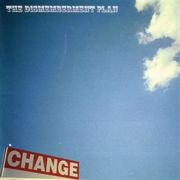
17 :: Dismemberment Plan
Change
(DeSoto; 2001)
How to write about this, my pick for album of the decade and probably favorite album? Does it suffice to say that I once proposed an article to CMG wherein I simply quoted the lyrics to “The Face of the Earth” in their entirety and then pointed to them, eyebrows raised, their quality self-evident? Though a combination of editorial chutzpah and good taste put an end to the idea, I still stand by the homerism, informed as it is by the Plan’s transcendent sublimation of creativity and accessibility, so difficult to balance, let alone distill. Change is an album with which I still check in weekly, like an old friend who lives in another city and for whom alone one subscribes to a long distance plan. It would also turn out to be the band’s last album unless you count Travis Morrison’s two solo efforts, or Maritime, or Statehood, which no one does. Even their follow-up acts sound like meek impersonations of a one-of-a kind juggernaut—and this, their Remain in Light (1980).
Take that same spark in the chest that the Plan set off when you first heard “You Are Invited” or “The City” or “Ice of Boston”—that indication that Travis Morrison might be Stephen Malkmus with an inclusive rather than ironic sense of snottiness—and mature it in the frighteningly short period after Emergency & I. Consider a long thread on the CMG boards on which various staff talked about “Ellen & Ben” and found everything in it from the difficulty in locating empathy as one grows older to a very adolescent sense of universal heartbreak to discreet boning. Broadly speaking, Change is a masterfully vulnerable metaphor about the endemic shittiness and beauty of being a human being and having to live with other human beings.
And if you don’t care about all this rooted philosophical crap, then there’s still some of the most melodic, breakneck, and inventive indie rock of all time. There’s still Joe Easley’s uniquely acrobatic drumming, Eric Axelson’s morphing bass, and Morrison’s apparent ability to sing in an everyman voice even when singing about having superpowers that allow you to inhabit another person millions of miles away as metaphor for the strange isolation and neutrality that would constitute true empathy. Which, together on something like “The Other Side” culminate into such textured and brilliantly arranged music that it just isn’t even fucking fair to other bands. How can an lineup like this be so criminally under-referenced? How do you break up this band? I still want to shake them, demand why. The thought of what could have followed Change haunts me.
Their chemistry was just undeniable, their musicianship staggering. A band I once played in had the privilege of opening for the Plan in Ottawa back in 2000, just before Change would be released, and I count hearing some of those unreleased songs performed during their soundcheck among the coolest twenty minutes of my life. I count the Plan’s set in Toronto during the “Death and Dismemberment” tour with Death Cab for Cutie among the best shows I’ve ever seen, up there with live show titans like Spiritualized and Mogwai and Sweep the Leg Johnny and Radiohead. It’s hard to describe in words just how seamless their rhythms were, how unpretentious their crescendos, just how fucking classic this band should, by all rights, be.
It’s cruel irony that a band so accessible should never attain the appreciation they were due.They once opened for Pearl Jam, and I think that might represent the apex of their exposure, just as opening for them was the apex of mine. (I think there were about fifteen people there.) But the Plan’s ability to make so effortlessly universal such intimate dilemmas, and to soundtrack that unease with all of the stubborn enthusiasm accorded each our own personal dramas, make them—at least during the forty-odd minutes you spend with their album—unstoppable. Perhaps I should simply quote “Secret Curse,” whose initial “anonymous hex on flavorless food and terrible sex / a day of no rhythm a night of no rest / and I do not know what sin I have not confessed” is cerebral emo to its more aching “I don’t know who you are…please, I’m sorry”; or something as simple as “there are days when a warm look from a strange face will make me forget my name.” To explain how these lines come off as inspiring really is in the listening; Morrison treated his audience as an equal in a conversation, and I simply can’t articulate the rarity of that.
Conrad Amenta
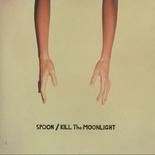
16 :: Spoon
Kill the Moonlight
(Merge; 2002)
With their status as one of the decade’s most consistent bands preserved (if only because the wonky Transference didn’t arrive until after the decade had ended), a vote for any Spoon album here seems like a vote for Spoon itself. It wouldn’t be a stretch to imagine Girls Can Tell (2001), Gimme Fiction (2005), or Ga Ga Ga Ga Ga (2007) in this spot. But it is Kill the Moonlight that represents Spoon at their most essentially minimal, and which augured the detached Dadaism with which Britt Daniel and company would pound out the band’s later sketches of rock cool psychology.
At the center of this record is “Paper Tiger.” With sticks counting 4/4 throughout and shuffling, random swaths of noise, the track seems to suggest not just the paring down of pop structures to an essential core, as Spoon did throughout Girls Can Tell, but that the act of paring could be made central, leaving Daniel out there and heightening the stakes of his lyrical game. “Stay Don’t Go,” “Small Stakes,” and the clomping piano of “Someone Something” prefer similar meditation on the sound of a single, resonant instrument as the unbreaking backbone of a song rather than the accumulation and unintentional obfuscation generally associated with studio work. On this record Spoon seem to best understand that experimentalism is intended to bring clarity, to obscure only selectively in order to remove predispositions and assumptions and so offer a specifically focused counter-argument. There’s still the band’s characteristic swagger—in “All the Pretty Girls Go to the City,” “The Way We Get By,” and so-straightforward-it’s-perfect “Jonathan Fisk”—but it’s made subsequent to the album-wide agreement to parse and pick with extreme prejudice. If nothing else, Spoon seem like one of the most self-critical bands of the decade.
What Kill the Moonlight also does is finally prove that founding member, drummer, and producer Jim Eno is Spoon’s secret weapon. When the ride cymbal comes in midway through “The Way We Get By,” the performance is perfectly selected and it’s recorded with such voluminous lucidity. The gesture gets at the discriminating prowess of Spoon, what would later allow them to put a half-dozen instances of shaker throughout Ga Ga Ga Ga Ga and have each seem like the perfect accompaniment in its moment.
Maybe most incredible is that such a side-stepping record would come in what was ostensibly the middle of an run starting with Series of Sneaks (1998)—almost ten straight years of unassailably great music—just a year after Girls Can Tell, and that the band would still make it all sound so effortless. It would turn out to be the band’s defining statement if not most commercially successful album, from which most of their future songwriting coups could from then on be traced directly.
Conrad Amenta
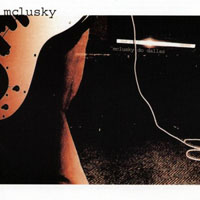
15 :: Mclusky
Mclusky Do Dallas
(Too Pure; 2002)
Falkous has opinions. Do Dallas is him telling us that…he has opinions. Not of the quiet, starched-shirt kind, but real and flamboyantly-dressed opinions, mostly about himself.
Curses (2007) would find him slouching back to the office; The Difference Between Me and You… (2004) was his every-which-way spring fever: a sonic collapse, his band maybe (sorta) knowing that the game’s up, the crew is dead, and, for better or worse, the party’s over. But it’s on Do Dallas where the Mclusky demon got razed and started tapping into its own unthinkable energy.
Because this is the record where the rhythm section of Chapple and Harding finally lock in—the perfectly tight pair of jeans to Falkous’ butcher-shank blade sticking out above the belt loop. I mean, people: “Lightsabre Cocksucking Blues.” This is the unassailable point at which Mclusky burned its old clothes—moved on from its Pixies, Shellacs, and even its own personal Best—and became its own outfit of destruction. This is where human tissue and completely inhumane buzzkill fiber get stitched up. Do Dallas is not group therapy. This is hard-fought bile pressure-valved into hard-fought (check the stop-and-go rush of “Gareth Brown Says,” or how “Alan is a Cowboy Killer” switches from smooth bass to ribbed cacophony) tension and release.
xx eat yr heart out. Mclusky did it first. Fuck. This. Band.
Which is one way of saying: I think this band is going to go down as one of the Greats of the Decade.
You can hear it especially in Falkous’ unhinged, destiny-baiting performance: this is his Award Tour, his crack-rock cliffsurfing dive into not exactly crazy-ass malingering, but as close as you can come to that when you’re playing in the tightest shit-band this side of the mid-90s and you have no money and you have no friends (they’re dead) and in two years all your equipment’s going to be lifted by brain-fried zombies as you stare into the distance and think Austin is shit and Philadelphia is shit and the World, yes, it loves us but it’s still our bitch. (The whole album might just be about screwing the governor’s daughter.)
Yes, so what I’ve always admired about Do Dallas is its brevity. It has short songs that go a long, long way.
The whole record feels like one large fucking venomous finger-wag, except the finger is de-nailed and set brilliantly ablaze and is moving pendulously in front of us; we (the suckers) follow that movement back-and-forth, we follow the light, hear its reverberating crackle but, I mean, back-up…reverberating crackle? Where exactly are we now? And, uh, is that the sound of a chainsaw or is it a pretty beat guitar I’m hearing, some campus killer pulling on the strings, muttering to themselves, revving up? Is this a professional-type deal? Will I end up in boxes or cartons? Who just took my picture?
It’s OK. Mclusky is just about to lay into “Chases.” You’re going to die.
Alan Baban
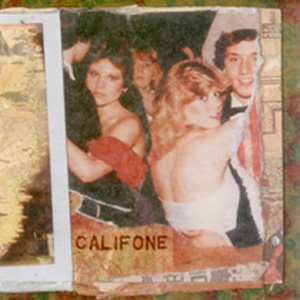
14 :: Califone
Quicksand/Cradlesnakes
(Thrill Jockey; 2003)
CMG isn’t giving out lifetime achievement awards for the decade, but I’m just going to go ahead and give one to Califone, whose string of five “proper” albums and a handful of delicious extras across the last ten years are virtually unmatched in terms of experimentation, gorgeous songwriting, junk percussion, Bretonian marvelousness, black humour, slide guitars, Brian Deck, physical deformities, wisdom, nightmarish folklore, animal bones/teeth, watermarks, washed-up porn stars, carnivals, dirty fingers, as well as pretty much everything that turns smells into memories, visions into tactile objects, memories into hallucinations, dreams into history, history into amnesia, concrete into steam, and sounds into more sounds.
For better or worse, this is communicated so well on every Califone album that going back and picking one seems almost capricious. Like Cocteau Twins, Stereolab, or—to pick a band who is sorely missed on this list, probably for similar reasons—the Clientele, they are better celebrated in their totality. The band’s Americana was already adequately sliced-up and reconfigured on Roomsound (2001) but, following the live improv Deceleration (2002; 2003) set and the departure of Deck, Quicksand/Cradlesnakes found them in a much rawer format. In that sense, you could make an argument for this being the essential Califone album simply because to hear it is the equivalent to opening the back of a mainframe from the ’60s (or a Califone product, right). You might not be any closer to understanding how it works, but at least you can better sense the processes in motion that somehow create such tangible results. Even if everything is painstakingly labored-over (I assume it is), it seems to play out in real time: the fuzzed-out blues-rock snear of “Your Golden Ass” and the Louisiana/Delta stomp of “Million Dollar Funeral” seem to walk a razor’s edge where they could fall off at any moment, a sensation the band never fully evoked at any other point in their career. The songs are also fun as hell, too. Fun, and mildly queasy when you realize they’re wrapped in the most virulently stream-of-consciousness Thomas Pynchon-in-the-Wild-West lyrics like “Peel the paper roses off your steel ribs.”
And yet in between those two mildly sinister anthems is “(Red),” proof that the evocative hymns of Roomsound would always have a privileged place. While Tim Rutili’s lyrics don’t always make sense, more often than not they say exactly what the song does. Here it’s “weightless repetition,” Rutili in awe of how easy the words roll off his tongue while his own vocals bounce off each other, the sharp clattering percussion somehow still creating a liquid form that glides along effortlessly. Miraculously, the most ephemeral material seems so complete: I swear there’s not two percussive taps alike on “Horoscopic. Amputation. Honey,” but the thing breathes. It’s interesting that both these tracks play with punctuation in their titles: one a self-contained universe, the other an orbit of autonomous elements, both fragmented and cosmologically complete like a Joseph Cornell box.
I’ve heard it said Califone appropriate Delta blues and Americana for a modern, electronically-oriented age. I’ve even heard them called “post-rock,” as if rock and its legacies had anything to do with them. No, I’d say the reverse, that whatever electronics they do use ultimately become assimilated into their own tactile universe, as if they were communicating from a time when our technology has already become dated. The idea of “roots” music as a layered, nearly-obsessive excavation of sounds and imagery rather than just an economy of means may represent a new paradigm, but the connection is still palpable. For Califone, the aims of generations-old American folk traditions and musique concrète aren’t all that different, both being expressions of the overwhelming desire to make the environment speak: “Made a machine / By describing the landscape.” Finally, it’s the overwhelming humility of creating: “God’s eyes are closed / Just like yours.”
Joel Elliott
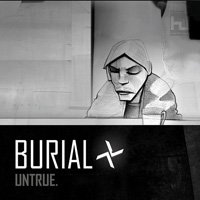
13 :: Burial
Untrue
(Hyperdub; 2007)
Picture the Watts Towers built ninety years later, but with Y2K detritus in place of wartime LA jetsam. In this reality, there’s no copper pipes/sofa frames/mosaics heaped into neat monoliths—instead you get greying games consoles, flyers, and detonated bits of Tim Westwood. These have somehow been sculpted into breathtaking cones by hands as steady as Sam Rodia’s; turn on the street lights and it’s the way many Londoners viewed Burial’s dazzling second album. He’d only been gone a year but already the capital’s populace was in love with him—between then and now he’s on par with city landmarks such as chestnuts or Big Dave’s Gusset.
The product of twelve months’ covert surveillance and lonely filtration of paydirt, Untrue was a wet dream for the Travis Bickles of Tooting. It played like a map of all that shone darkly in the streets around the congestion charge—sleeplessness, cheap E, the commercial death of the rave scene—yet somehow it generated a vitality of its own, like DeNiro making guns out of drawer runners. Opening with an augmented Alien^3^ sample that showed the parameters of Will Bevan’s taste (of all the films in the franchise he selected the bleakest and most polarising; the one with bald Brits and no pulse rifles), Burial proceeded to tease out the blocky rhythms of the city, shooting beats across ethereal pads and taping the rainfall on gargoyles. Take “Archangel,” the album’s most visited track on Youtube: here, Bevan grabbed the Hudson jump FMV from Metal Gear Solid 2 (2002) in one hand, the only piece of RJ’s “One Wish” that doesn’t sound like R Kelly’s “Trapped in the Closet” in the other, and blurred them together in a kind of sooty alchemy, producing a hymn to everyone who’s ever missed the night-bus. It’s as beautiful as anything you’d expect from a metropolis with improper drainage, but then Untrue is so much more than just Loveless (1991) for Zone 2 only. The flickering alleyways Bevan captured resonate beyond the clay and concrete, making Untrue Metacritic’s second highest rated of Albums 2007 (Swedish trance = untouchable). And I think I know the reason why such a wide demographic went hot for it: through an attention to detail so keen you almost miss it entirely, Burial perfected an aural soup that pretty much everyone’s had a spoon of. Even if you haven’t been there you’ve been there, falling asleep in the middle of the night as someone cranks out dubstep half a street away. Memory and reality start wrestling, demonstrated clearly on the gorgeous “Endorphin” where defunct vinyl crackles in a glowing hatchback. It’s a long, dark night chasing sounds around the city; barren but the opposite of hopeless.
Only once does Untrue become openly upbeat and that’s for the start to “Shell of Light,” a semi-Chicane remix from 1999A (where the right things got in the dance chart). Despite it featuring only minimal city phantoms that toy with the happy keyboard hook, it doesn’t break step with the rest of the album: like its title says it’s only a beacon, though Bevan’s journey is self-lighting enough to prevent you becoming encrusted. The most personal experience I can the track (and the album’s) texture to is falling asleep at a Fabric DnB night and then finding yourself outside, trying car doors along Charterhouse Street in the hope you can grab a few Zs. If you did that now with this record on headphones/trios of clubbers stepping over you, you’d almost swear blind you could hear a girl reviewing Bullet Boy (2004) to a chorus of hoovers, but then that’s just the intro to “Etched Headplate”; one clear voice in the gloom. Either way, to anyone who’s ever been awake in a city late at night (which is everyone, because you don’t often get born in a field), there’s not a lot on Untrue not to swoon at. It’s not just a partner substitute for people who, in Bevan’s own words, have “never been to a festival, never been to a rave in a field, never been to a big warehouse, never been to an illegal party.” It’s a genre statement from a boy who fell asleep to his older brother’s rave tapes, and who’s now grown up, grown cleverer, seen some shit and grown a time machine, tying a ribbon on his heritage. Burial once said music made him feel like he did when he first saw The Terminator (1984). Congratulations, Mr. Bevan—you’ve just successfully gone back and fathered yourself.
George Bass

12 :: Animal Collective
Strawberry Jam
(Domino; 2007)
The Animal Collective narrative arc soars over the span of the decade with such elegant geometry that it feels, in retrospect, like a perfectly mapped-out movie script. We all know the story by now: band begins in experimental obscurity and progresses ever-closer towards a conclusion of almost unanimous acclaim and a fully actualized creative expression. Just based on the sheer universal acceptance of that narrative, and the convenient way it squeezes ever-so-snugly between the bookends of the ’00s, it’s hard not to think of Animal Collective as the definitive band of the decade. Even if you hate them, chances are you’ve wasted more spittle arguing with people about them than any other band of the past ten years. Adjectives like “important” and “definitive” have been looming over Animal Collective for years now. So on that fateful day in January of 2009—right at the beginning of the month, even; remember the way its release date almost felt like a joke at the expense of the very notion of Album of the Year, or a coy apology to every other band who would be putting out a record over the next 11 months?—when Merriweather Post Pavilion was released, everybody seemed to breathe a collective and very theatrical sigh of relief, the way an entire country exhales when a gymnast sticks a landing in the Olympics. Animal Collective had made the record they’d been progressing towards all decade long, and almost everyone instantaneously started capitalizing “Important” and “Definitive.” But it felt, also, like an unburdening. That record was great, yeah, but its greatness meant that we could have the other ones back, imperfections and all.
Strawberry Jam was, upon its release, heralded as Animal Collective’s most accessible record to date. Though it’s only been a few years, it’s held up fascinatingly in the shadow of MPP, which most people would now say assumes that title. Strawberry Jam is something trickier. Its veneer is deceptive: it’s got hooks (the only Animal Collective song simpler and more delectably pop than the first half of “Derek” is the monster jam that is the second half of “Derek”), but they’re only there to wage a war with the darker parts of the record, like a deranged argument between the voices in its head. On the hypnotic “#1,” Avey Tare and Panda Bear sound not like they’re blending their voices into the lush, enveloping warmth of Sung Tongs (2004), but like they’re singing two completely different—discordant—songs. Prior to Strawberry Jam, almost every Animal Collective song (or at least the ones that actually were “about” something) sang the praises of human connections and brotherhood. Both lyrically and stylistically, then, Strawberry Jam is the record on which the band spit out its own Kool Aid.
Though it represented a widely acclaimed stylistic step forward for the band, Strawberry Jam questions our perceived need to move forward and articulates how difficult such a progression can sometimes be. There’s a wistfulness (“an obsession with the past is like a dead fly”) and a feeling of social disconnect (“you’re just an inside”) hidden even in the zany pop of “Peacebone.” These themes recur and develop throughout Strawberry Jam, but everything reaches a fever pitch with the mid-album sequence of “For Reverend Green” and “Fireworks,” perhaps the most resounding 1-2 punch the band’s ever socked us with. “Fireworks,” and to some extent all of Strawberry Jam, is about that tricky and all too human predicament of knowing how to make yourself feel better (in this case it’s engaging with the impossibly chatty outside world: What’s the day? What’s you doing? How’s your mood? How’s that song?) but feeling hopelessly unable to (the greeting “passes right by…now it’s gone”). Even with the ostensible confectionery sheen of the record (legend has it Panda Bear wanted it to be the sonic equivalent of the cool, untouched surface of a single-serving package of jam), there’s an insidiousness to this record’s unsolved mysteries, the way these internal narratives are never neatly resolved. People love records like Merriweather Post Pavilion and Sung Tongs and even Here Comes the Indian for their consistency, the way their atmospheres feel panoramic and distinct. I love Strawberry Jam for its inconsistency: its stubborn insistence upon jerking you around. I think that’s when Animal Collective’s at their personal best—when they’re skeptical of pieces that fit together too snugly, when they land a little bit short of that arc’s reassuring wholeness.
Lindsay Zoladz

11 :: Modest Mouse
The Moon & Antarctica
(Epic; 2000)
I’m not even listening to this album while I write this, so deep within me can The Moon & Antarctica bloom at any given moment. It’s on call: “Third Planet”’s indomitable opening lick; the epochal wheeze of “The Stars are Projectors”; the lingering sweetness of “Wild Pack of Family Dogs” despite it’s disturbing implications and plain terrifying literalness; indie rock writ in runes. What Isaac Brock created ten years ago seems now a life-long companion—more than that, a truism I’ve carried in my wallet, the wallet handed to me by the bloodied doctor when I left the womb, before I had a butt pocket to keep it in or money to justify its long sleeves, a truism like: I will have children myself one day; I pick my nose; The Moon Antarctica will be my favorite album of the decade. And so, Modest Mouse, having crawled intimately deep into my viscera, is impossible to extract—not just from my organs, but from my cogs, from my ticking, whirring essentials—uncomfortably inaccessible to easy quantification because it’s what I’d use as an abacus anyway. Seriously: this record, so sprawling, writhing, and burdened with ambitions it ostensibly has no means to satisfy, is the alpha and the omega of my tenure as critic, both a reason for trying and the last thing I should ever attempt to tackle. This blurb, of course, is neither, just a cold approximation of vast sentences and grandeur too distant to embrace or too far away to healthily imagine—like the moon, and like Antarctica. So until the day comes when I put my name to one last opinion, when I can pull from the varmint deep inside the right sentence comparable in length to the paragraph before you to assiduously dissect “Paper Thin Walls,” when you’re watching me watch Isaac Brock watch me for a sign that I’m correctly attending to the love for his music I have within me, next to the animal he’s set loose, until I’m capable of wrapping my arms around it, let me persist, a cardboard cutout with an infinitely long stretch of silhouette—pitch black and deep—reaching clumsily into the unknown.





